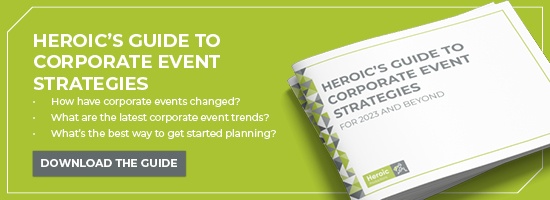October 26, 2022
Measure Event ROI and Brand Attribution to Better Strategize Your Next Event
Proving good event ROI is one of the most important practices a business can develop to shore up the budget for future events. While measuring ROI can sometimes be elusive, if you align your event strategy with company goals, you’re better able to build a solid business case.
Event ROI is tied to the event’s purpose, which should be guided by a company’s strategy. When the value of an event is measurable, event strategists can best demonstrate how future events will help to propel company goals. Company events are typically tied to four purposes: bringing people together, introducing new messaging, launching a product, and educating your team. Here’s how to measure event ROI for each of those purposes.

Bringing people together
The ROI for bringing people together can be determined by an event’s effect on a company’s culture and community. This is measured in how your attendees respond to an event. First and foremost — do they attend? Be prepared to design your gathering based on how potential attendees might feel about the event and how you’d like them to feel walking away from the event. If your company just laid off 100 people, your team may not want to see the red carpet rolled out for a celebration. But if you always host an annual event and cancel it this year, what signal does that send? The impact of the investment determines its value.
Whether you’re celebrating a win or rebuilding from a loss, an event can be a great way to build team morale. If you want to honor your achievers with the gift of a significant experience, make it memorable. Some people don’t want to travel with coworkers, even if it’s an all-expense paid trip.
If the event is at an attractive location, it can be an incentive for teammates to get to know each other better. If you’re going to take people away from their regular routines, an investment in an experience can make it worth their while. If it’s January at your office in Chicago, a trip to Hawaii is worthy of consideration. Once you make the decision to invest in an event, its value can be measured by the response of your attendees. This not only includes their willingness to attend but also how much they enjoyed themselves. How did the event make them feel? Consider asking with a post-event interview.
GET INSPIRED: UNIQUE CORPORATE EVENT PLANNING IDEAS
Introducing new messaging
With any rebranding initiative, control over the messaging is of the utmost importance, and an event’s ROI is measured in the successful execution of the message. Getting your employees to unify behind messaging is a good investment to ensure a successful rollout. You can control the narrative of your company’s rebrand. The value of investing in this type of event can be as simple as a question and answer session to clarify any misinterpretations.
For example, if you’re introducing a new logo and brand name to your company, you could email that branding to thousands of team members, but when new messaging is emailed, you’re not able to create context. There’s no forum for questions.
Instead, a virtual meeting with your CEO can more clearly communicate the message, providing a firm foundation for connection before its lost in translation. In some cases, companies have hosted in-person meetings where cell phones are put into lockers to limit distractions. When a team is united in messaging, they’re less likely to leak an announcement before it’s been properly communicated to the group. The ROI of an event like this is best determined by measuring engagement with the message. Positive feedback, or the absence of negative feedback, is indicative of a successful messaging campaign.
CONSIDERING A SPEAKER?
Launching a product or service
Experiential marketing is nothing new, as brands have been putting their products in front of people as far back as the first world’s fair. Infusing human senses create memories that can translate into a powerful and positive emotional response to a product or service.
That type of event ROI is typically measured with sales. Wrigley’s introduced their chewing gum to the masses at the world’s fair in 1893. Needless to say, that proved to be a solid investment of time and resources. With modern-day events, many companies rely on event applications to track attendance demographics and the timing-related specifics of sales. Some of the more popular event apps include Whova, EventBoard, and Attendify.
The introduction of something new is a delicate process, and there’s inherent value in taking your time with a persuasive launch. People are often hesitant to accept change, with reactionary tendencies that reject new ideas. Investing in an event provides an opportunity to show and tell stories with multimedia, multi-sensory, immersive experiences. Whether it’s William Wrigley showing the value of chewing gum, or Steve Jobs showing the value of an iPod, it’s very effective for consumers to experience a new product in person.
Educating your team
If you’re rolling out a new product line, you may not see sales results for a year or more. The same can apply to an initiative to educate a team. To consider the value of training in person, we think most about retaining information. In our virtual world, it can be challenging to keep people’s attention with an online course.
One of the biggest advantages of an in-person educational event is the opportunity to remove people from their regular schedules and into an environment that inspires creativity. By providing an immersive experience, you give your team a chance to be present and retain information. When you share with your sales team what they need to know to be successful, that event ROI is going to show up in your sales metrics. Another way to measure that ROI is with a thoughtful post-event survey. Did your attendees really learn anything? Ask specific questions and find out.
Measuring event ROI with strategy
Whatever your event goals may be, the value of an in-person event is here to stay. Educators, entertainers, and marketers alike are asking their audiences to put phones down and engage their senses. The results are invaluable.
To determine the value of your next event investment, start with strategy and then measure with precision. At Heroic, we ask the right questions so that you can invest with confidence.





